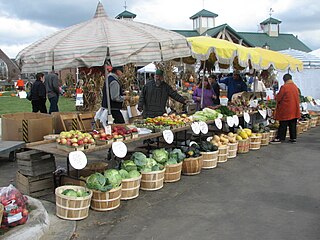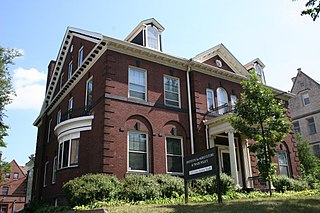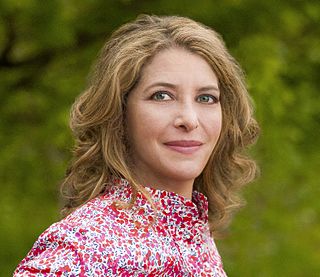Nina F. Ichikawa (formerly Nina Kahori Fallenbaum) is an American writer, agricultural activist, and the executive director of the Berkeley Food Institute. [1]
Nina F. Ichikawa (formerly Nina Kahori Fallenbaum) is an American writer, agricultural activist, and the executive director of the Berkeley Food Institute. [1]
Born Nina Kahori Fallenbaum, she grew up in Berkeley, California. [2] She attended Berkeley High School, served as a co-coordinator of the Asian Pacific Student Union, and helped to establish the first high school Asian American Studies program in the United States. [3] [4] [5]
Ichikawa graduated with a BA from U.C. Berkeley and an MA from Tokyo's Meiji Gakuin University. She lived in Japan for ten years. After several years on the east coast, she returned to the San Francisco Bay Area with her husband in 2015. [2]
Ichikawa is the former food and agriculture editor for Hyphen magazine, a publication covering Asian-American arts and politics. [6] [7] Her writing has also been published in Nichi Bei Times,Nikkei Heritage,Civil Eats, [8] Discover Nikkei, [9] Rafu Shimpo , [10] and Al Jazeera America . [11] She also contributed an essay to the 2013 book Eating Asian America: A Food Studies Reader. [12] [13] [14] Ichikawa was also a 2011-13 Institute for Agriculture and Trade Policy Food and Community Fellow, [15] and during her fellowship, she helped found AAPI Food Action, [16] a food policy lobbying organization. [7]
Ichikawa previously worked on the Obama administration's "Know Your Farmer, Know Your Food" initiative at the U.S. Department of Agriculture. [17] In January 2021, she was featured in an in-depth profile by the Cal Alumni Association of U.C. Berkeley. [18]
As the executive director of the Berkeley Food Institute, Ichikawa has spoken with a variety of news outlets about a range of topics related to sustainable food, including the importance of urban farming "for elders, for low-income families, for immigrants," [19] and the history of backyard and rooftop gardening in Asian American communities. [20] She also discussed the impact of the COVID-19 pandemic as "an opportunity for meat-eaters to join together with sustainable producers of meat, and with meat and dairy industry workers, to all unite together and say we want a better system." [21] She has also been featured in an article written and sponsored by the nonprofit organization CUESA, [22] and quoted for her expertise by KQED [23] and Prevention magazine. [24] In 2017, after the California Values Act was passed to provide new safeguards for undocumented immigrants, Shakirah Simley of the San Francisco Chronicle asked "chefs, farmers and advocates" about the meaning of the word "sanctuary," including Ichikawa, who said:
In 2021, after the Berkeley Food Institute collaborated with the nonprofit advocacy group Restaurant Opportunities Centers United on a study on racial and gender bias in the restaurant industry, Ichikawa spoke with The New York Times about how "there are biases that lock people into certain positions." [26]
Ichikawa is currently a member of the California Farmer Justice Collaborative. [27]
Ichikawa’s great-grandfather emigrated from Japan to the U.S. in 1895 and purchased land before the California Alien Land Law of 1913. [12] For three years, he and his family lived in a concentration camp during World War II, but continued to pay property taxes on the land. [12]
A photograph of Ichikawa's family, including her grandmother, on a trip to Yosemite National Park in the 1930s is featured in an NBC News article about Asian Americans and the travel industry. [28]
In 2019, the San Francisco Chronicle profiled the efforts of Ichikawa and her husband to house her mother, Betty Kano, an artist and educator, in a "tiny home" on their shared property. [2]
Taiwanese cuisine has several variations. The earliest known cuisines of Taiwan are that of the Taiwanese indigenous peoples. Over hundred years of historical development; mainstream Taiwanese cuisine has been influenced by Hakka cuisine, the cuisines of the waishengren, and Japanese cuisine. Although southern Fujian cuisine has had the most profound impact.

A farmers' market is a physical retail marketplace intended to sell foods directly by farmers to consumers. Farmers' markets may be indoors or outdoors and typically consist of booths, tables or stands where farmers sell their produce, live animals and plants, and sometimes prepared foods and beverages. Farmers' markets exist in many countries worldwide and reflect the local culture and economy. The size of the market may be just a few stalls or it may be as large as several city blocks. Due to their nature, they tend to be less rigidly regulated than retail produce shops.

The cuisine of California reflects the diverse culture of California and is influenced largely by Hispanic American roots, alongside Eastern Asian and Oceanian influences and Western European influences, as well as the food trends and traditions of larger American cuisine.

Alice Louise Waters is an American chef, restaurateur, and author. In 1971 she opened Chez Panisse, a Berkeley, California restaurant famous for its role in creating the farm-to-table movement and for pioneering California cuisine.
Dale Minami is a prominent Japanese American civil rights and personal injury lawyer based in San Francisco, California. He is best known for his work leading the legal team that overturned the conviction of Fred Korematsu, whose defiance of the incarceration of Japanese Americans during World War II led to Korematsu v. United States, which is widely considered one of the worst and most racist Supreme Court decisions in American history.

Dog meat is the flesh and other edible parts derived from dogs. Historically, human consumption of dog meat has been recorded in many parts of the world. During the 19th century westward movement in the United States, mountainmen, native Americans, the U.S. Army, as well as the Confederacy during the American Civil War frequently had to sustain themselves on dogmeat; first to be consumed would be the horses, then the mules, and lastly the dogs. China, Nigeria, Switzerland, and Vietnam, and it is eaten or is legal to be eaten in other countries throughout the world. Some cultures view the consumption of dog meat as part of their traditional, ritualistic, or day-to-day cuisine, and other cultures consider consumption of dog meat a taboo, even where it had been consumed in the past. Opinions also vary drastically across different regions within different countries. It was estimated in 2014 that worldwide, 27 million dogs are eaten each year by humans.

The Rafu Shimpo is a Japanese-English language newspaper based in Little Tokyo, Los Angeles, California and is the largest bilingual English-Japanese daily newspaper in the United States. As of February 2021, it is published online daily. In print publication is only on Tuesday, Wednesday, Thursday, and Saturday.
Nina Planck is a food writer and farmers' market entrepreneur.

Nisei Week is an annual festival celebrating Japanese American (JA) culture and history in Little Tokyo, Los Angeles. Nisei means 2nd generation in Japanese, describing the first American born Japanese, a group which the seven-day festival was originally meant to attract. Though named for the Nisei generation, Nisei Week is no longer targeted at Niseis, nor is the festival still contained within a week. Nisei Week Foundation president for 2006, Michelle Suzuki, described the festival as "the opportunity for people of all backgrounds to celebrate Japanese heritage and culture".

The Institute for Agriculture and Trade Policy (IATP) is a non-profit research and advocacy organization that promotes sustainable food, farm, and trade systems. IATP has offices in Minneapolis, Minnesota, Washington, D.C. and Berlin, Germany, and operates both locally and internationally.
Akiko Ichikawa is a transdisciplinary artist, editor, and writer-activist based in New York City. She has written on contemporary art and culture for Flash Art,Art in America, Hyperallergic, and zingmagazine. Ichikawa's article on the photography of Dorothea Lange, Toyo Miyatake, and Ansel Adams at Manzanar became popular in fall 2016, following comments by a spokesperson of a Trump-supporting PAC on Fox News.
Eat Just, Inc. is a private company headquartered in San Francisco, California. It develops and markets plant-based alternatives to conventionally produced egg products and cultivated meat products. Eat Just was founded in 2011 by Josh Tetrick and Josh Balk. It raised about $120 million in early venture capital and became a unicorn in 2016 by surpassing a $1 billion valuation. It has been involved in several highly publicized disputes with traditional egg industry interests. In December 2020, its lab-grown chicken became the first cultured meat to receive regulatory approval in Singapore. Shortly thereafter, Eat Just's cultured meat was sold to diners at the Singapore restaurant 1880, making it the "world's first commercial sale of cell-cultured meat".

Anya Fernald (1975) is an American entrepreneur, chef, and sustainable agriculture expert based in the San Francisco Bay Area. She founded Live Culture Co., a business and marketing consulting company, the Eat Real Festival Company, and Belcampo Meat Co., a producer of sustainably sourced meats headquartered in Oakland, California, of which she was founding CEO. She has published a cookbook and appeared as a judge on the Food Network's Iron Chef America, Iron Chef Gauntlet, and The Next Iron Chef.
Chizuko Judy Sugita de Queiroz is an American artist and art educator; her paintings depict her memories of a childhood during the Japanese American internment.
Lisa Changadveja is an American political strategist who has worked in multiple capacities on presidential campaigns for Hillary Clinton. She is currently chief of staff at MoveOn. She is also an author and illustrator of two children's picture books, "Chang's First Songkran" and "The Only Girl on a Motorcycle."

Nina Teicholz is a journalist who advocates easing restrictions on naturally-occurring fats, including so-called "saturated" fats, in the American diet.
Marsha Aizumi is an American author, educator, and LGBTQ+ activist. She co-founded the first PFLAG chapter for Asian-Pacific Islanders.

Kala Bagai was a South Asian American immigrant and community activist. The Smithsonian described her as "a life-long advocate for immigrants and a mother figure among South Asian communities in California."
Tsutomu "Jimmy" Mirikitani was an American artist notable as the subject of the 2006 documentary film The Cats of Mirikitani.
Nobuko JoAnne Miyamoto is a Japanese American folk singer, songwriter, author, and activist in the Asian American Movement. She was a member of the band Yellow Pearl along with Chris Kando Iijima and Charlie Chin. They are known for co-creating the 1973 folk album A Grain of Sand: Music for the Struggle by Asians in America. This album is considered the first Asian-American album in history. She was a member of the band Warriors of the Rainbow during the late 1970s.
food writer and activist Nina F. Ichikawa argues in an essay published in Eating Asian America: A Food Studies Reader that Asian-American farmers, greengrocers, and entrepreneurs have been instrumental in the U.S. health food movement — a role that has been obscured if not misremembered. In particular, she points to Japanese-Americans Aveline and Michio Kushi, who opened the natural foods store Erewhon back in 1966 — long before Whole Foods existed — and inspired a host of other natural food stores to pop up.